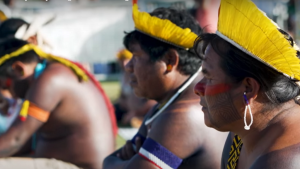The following article written by Hannah Harland was first posted by The Canary and highlights the assaults of agribusiness on indigenous land rights rights in Brazil
BRAZIL’S SENATE APPROVES A CONTROVERSIAL BILL IN MAJOR SETBACK FOR INDIGENOUS LAND RIGHTS

Less than a week after celebrations of a key victory in Brazil’s supreme court, the country experienced a major setback for Indigenous rights.
On 21 September, Brazil’s supreme court judges came out with a majority against a regressive piece of Indigenous land rights legislation. However, Brazil’s senate has now approved this same bill, which limits Indigenous people’s rights to ancestral lands.
Hundreds of Indigenous demonstrators had rallied in Brasilia as the court weighed the legality of the so-called ‘time limit trick’. Specifically, the policy states that:
Indigenous peoples in Brazil who could not prove they were living on their land on October 5, 1988 (the date of the signing of the current Constitution) had no right to have those lands demarcated (officially mapped out and protected
In spite of strong Indigenous opposition and the supreme court’s ruling, the senate passed the new bill. The legislation sailed through on 27 September with 43 votes for and 21 against.
‘Time limit trick’
Indigenous groups have said that the legislation violates their rights. In particular, they highlighted that many groups were forced from their ancestral lands during European settler colonisation. For example, armed militias violently evicted the Xokleng tribe for European colonists in the 19th and 20th Centuries. The time limit trick would prevent the Xokleng tribe from claiming land rights for these ancestral territories.
The legal instrument will also impact Indigenous groups who were displaced from their lands during the military dictatorship that ruled Brazil from the 1960s to 1980s.
Related articles
- US Federal Trade Commission and 17 states take Amazon to court
- ‘Voice to Parliament’ bringing out the racist underbelly of Australian society shows why it’s vitally needed
Read on…
Last week, Justice Edson Fachin said in his ruling:
As can be seen from the text of the Constitution, the original territorial rights of the [Indigenous people] are recognized, but in any case they pre-date the promulgation of the Constitution.
Now, the new policy could threaten dozens of uncontacted tribes. These Indigenous groups live in voluntary isolation, with little or no contact from the outside world.
Agribusiness lobby
Of course, the big agribusiness lobby has been pushing the limitation.
Global-North-headquartered corporations like JBS and Cargill have been driving deforestation in the Amazon for soy production and cattle ranching. The Monitoring of Andean Amazon (MAAP) project has found that since 2020, companies have deforested at least 42,000 hectares of the Brazilian Amazon for soy plantations. These industries threaten the theft of Indigenous ancestral lands.
Since Brazil elected Luiz Inácio Lula da Silva as president, Brazil’s deforestation rates in the Amazon have sharply declined. In addition, Lula has put Indigenous rights at the core of his legislative agenda. On 5 September, Lula recognised two new Indigenous reserves. As the Canary reported in April, the government also intends to establish 14 new reserves to cover 1.5 million hectares. So far, the president has formally declared eight of these.
However, the senate approval of the time limit trick presents a challenge to Lula’s action on Indigenous rights. As Leonardo Sakamoto previously highlighted for the New Internationalist on Brazil’s lower house first passing the bill in May:
This legislative situation comes about because Lula’s government does not have a majority in Congress, and must negotiate matters vote-by-vote in a parliament that is generally conservative.
Of course, this is also the case in the Senate, where Lula’s coalition holds just 27 seats of the 81-seat house. Despite recent wins, the approval of the time limit trick makes it clear that Indigenous people still face an uphill battle against corporate interests in Brazil.
Additional reporting via Agence France-Presse
28.9.23
__________
also see:
Canada is trying to send indigenous water protestors to prison – Sam Carliner, Left Voice (USA)
